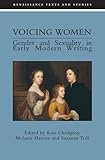Voicing Women : Gender and Sexuality in Early Modern Writing / Melanie Hanson, Suzanne Trill, Kate Chedgzoy.
Material type: TextSeries: Renaissance Texts and Studies : RTSPublisher: Edinburgh : Edinburgh University Press, [2022]Copyright date: ©1996Description: 1 online resource (208 p.)Content type:
TextSeries: Renaissance Texts and Studies : RTSPublisher: Edinburgh : Edinburgh University Press, [2022]Copyright date: ©1996Description: 1 online resource (208 p.)Content type: - 9781853311086
- 9780585122601
- English literature -- History and criticism -- Early modern, 1500-1700
- English literature -- Women authors -- History and criticism
- English literature -- Early modern, 1500-1700 -- History and criticism
- Feminism and literature -- History -- 16th century -- Great Britain
- Feminism and literature -- History -- 17th century -- Great Britain
- Feminism and literature -- Great Britain -- History -- 16th century
- Feminism and literature -- Great Britain -- History -- 17th century
- Gender identity in literature
- Renaissance -- England -- England -- Great Britain
- Renaissance -- England
- Sex role in literature
- Women and literature -- History -- 16th century -- Great Britain
- Women and literature -- History -- 17th century -- Great Britain
- Women and literature -- Great Britain -- History -- 16th century
- Women and literature -- Great Britain -- History -- 17th century
- Literary Studies
- LITERARY CRITICISM / Women Authors
- 820.9/9287 21
- PR428.F45 V65 1996eb
- online - DeGruyter
- Issued also in print.
| Item type | Current library | Call number | URL | Status | Notes | Barcode | |
|---|---|---|---|---|---|---|---|
 eBook
eBook
|
Biblioteca "Angelicum" Pont. Univ. S.Tommaso d'Aquino Nuvola online | online - DeGruyter (Browse shelf(Opens below)) | Online access | Not for loan (Accesso limitato) | Accesso per gli utenti autorizzati / Access for authorized users | (dgr)9780585122601 |
Frontmatter -- Contents -- Acknowledgements -- Notes on Contributors -- Introduction: 'Voice that is Mine' -- The Word and the Throne: John Knox's The First Blast of the Trumpet against the Monstrous Regiment of Women -- Engendering Penitence: Nicholas Breton and 'the Countesse of Penbrooke' -- Women Writers and Women Readers: The Case of Aemilia Lanier -- The Canonization of Elizabeth Cary -- Dionys Fitzherbert and the Anatomy of Madness -- The Torture of Limen a: Sex and Violence in Lady Mary Wroth's Urania -- The Iconography of the Blush: Marian Literature of the 1630s -- Playing the 'Masculine Part': Finding a Difference within Behn's Poetry -- Read Within: Gender, Cultural Difference and Quaker Women's Travel Narratives -- Contra-dictions: Women as Figures of Exclusion and Resistance in John Bunyan and Agnes Beaumont's Narratives -- Seditious Sisterhood: Women Publishers of Opposition Literature at the Restoration -- Index
restricted access online access with authorization star
http://purl.org/coar/access_right/c_16ec
Voicing Women offers fresh, theoretically inspired readings of women Renaissance writers, as well as detailed critical introductions and notes. It reveals the extent of the material restraints on women's expression in the sixteenth and seventeenth centuries, illustrating the difficulties faced by women writers and their strategies to overcome them. The use of female voices in male-authored texts and the different ways in which the body is portrayed by male and female writers is discussed in detail, and there are revelations about the religious and political contexts of the women's work. This will be an invaluable resource for all those studying Renaissance texts.
Issued also in print.
Mode of access: Internet via World Wide Web.
In English.
Description based on online resource; title from PDF title page (publisher's Web site, viewed 02. Mrz 2022)


